Resilience of Fisheries
Healthy, fully functioning ecosystems have an increased ability to resist change from disturbance. In fisheries, this resilience, or ability to cope with disturbance, can be affected by biological stressors such as disease, but can also be deteriorated by human-caused stressors such as pollution, overharvesting, loss of habitat (destruction of the reef), or a combination of stressors like climate change. Resilience can, however, be increased by management actions.ref

The Maldivian fishing fleet uses traditional artisanal methods. The fleet consists of traditional Maldivian boats, which mainly use rod and line fishing for yellowfin tuna and reef fishes, making it one of the last remaining relatively sustainable fishing fleets. Photo © Alex Barron
Resilience is broadly defined as the capacity of a system to respond to and absorb disturbance while retaining essentially the same function, structure, and feedbacks. ref To manage fisheries effectively, there is a growing need to understand the resilience of the integrated social–ecological system. In the context of fisheries, the ‘system’ includes all marine resources, the coastal and marine environment, and the people who are dependent upon it.
For fisheries, desirable outcomes of a resilient system may include: sustainable fish stocks that support the long-term preservation of jobs, identities, and cultures in fishing societies, the increased resilience of other marine resources, and sustained ecological health. ref
Ecological and anthropogenic stressors can undermine the resilience of healthy fisheries (e.g., pollution, overharvesting, loss of habitat, climate change). When resilience is undermined sufficiently, a phase shift may occur to an alternate state dominated by a different suite of organisms. ref This ‘alternate state’ may be either desirable (e.g., a system with the ability to withstand a disturbance and maintain essential functions) or undesirable (e.g., the system resists attempts to move toward improvement or sustainability).
Resilience is a property that makes something difficult to change. Degraded states can be resilient to change. For example, researchers have explored how potentially beneficial short-term behavior can lead to detrimental long-term outcomes that are difficult to avoid or eliminate (e.g., the poverty trap ref). A heavily exploited fishery may be resilient to change. For example, in Southeast Asia, coral reefs, damaged by destructive fishing methods such as blast fishing and fishing nets, have converted rocky reef substrata into unconsolidated rubble beds that have little hope for natural recovery. ref Even where reefs are relatively intact, overfishing can cause shifts in ecological functioning, resulting in decreased coral cover and lower biodiversity. ref
Solutions for how to sustainably manage coral reef fisheries are known for nearly every fishery type. Fisheries resilience is supported by sustainable coral reef fisheries management, which incorporates the use of fishery assessment tools, of processes that engage stakeholders, including fishers, of policy reforms, and of market transformation efforts.
